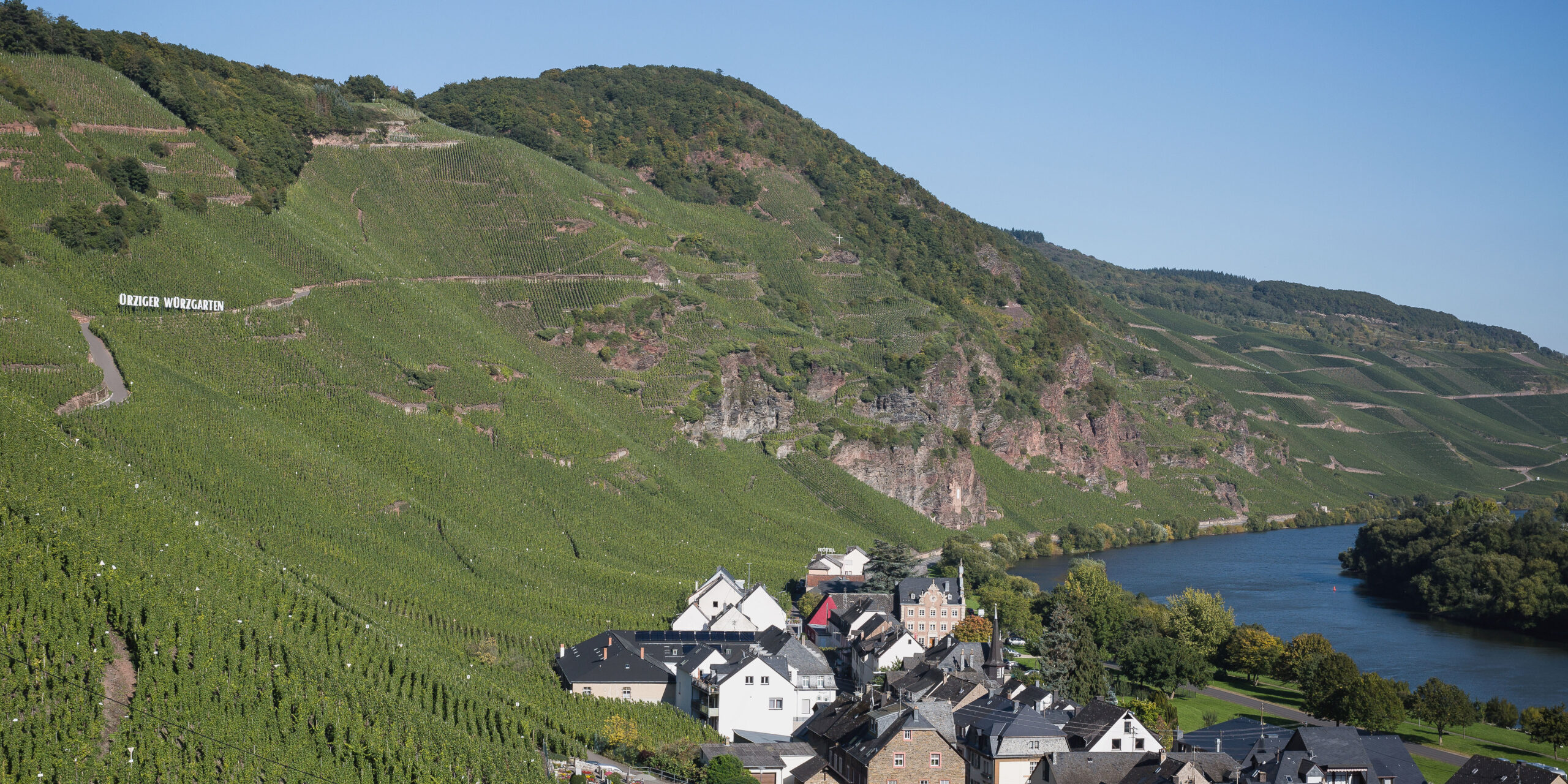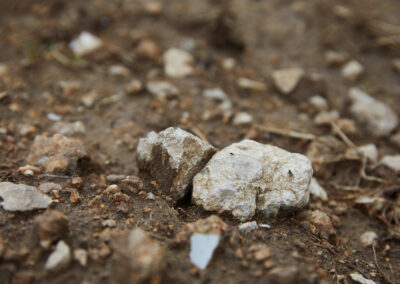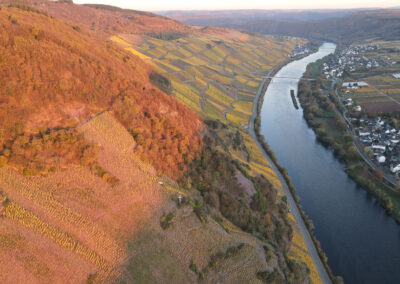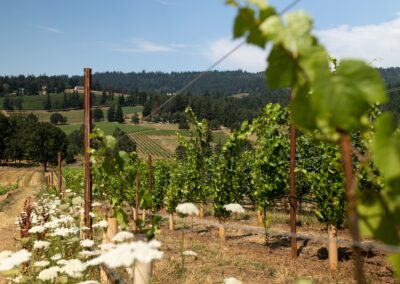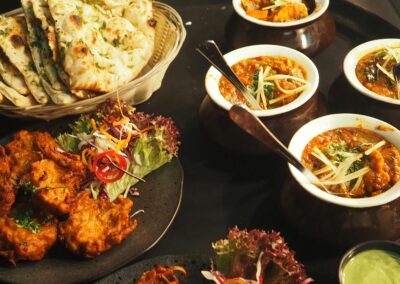For us, sustainability starts at our roots. Each of our producers is dedicated to protecting our planet while making some of the world’s greatest wines. They know that as responsible winegrowers, they have an obligation to maintain healthy soil, healthy vines, and a healthy relationship with the earth, to ensure that future generations of winemakers can continue to produce these superior-quality wines. Here’s a look at the various efforts our producers are making to turn this goal into a reality.
DR. LOOSEN
Did you know that the Dr. Loosen estate has been in the same family for over 200 years? When Ernst “Erni” Loosen took over the estate in 1988, he realized the immense raw potential of these historic vineyards, with their ungrafted vines averaging 60-years-old. To tap into this potential, Erni knew there were dramatic changes that needed to be made. He stopped all chemical fertilization and only allows moderate use of organic fertilizers and soil amendments. Erni and his brother, Thomas, have extended their commitment to sustainable practices beyond the vineyards and into the winery, implementing improvements in recycling, energy efficiency, and water conservation. In 2012, Dr. Loosen and Loosen Bros. (producer of Dr. L) achieved certification through Germany’s stringent “Eco-Step” program, which covers the full spectrum of environmental, conservation, and safety consideration in both the vineyards and the winery.
VILLA WOLF
Erni has extended his sustainability efforts from Dr. Loosen to Villa Wolf, his winery in the Pfalz region of Germany. The Villa Wolf estate is managed by a talented young winemaker, Patrick Möllendorf, who previously worked in the cellar at Dr. Loosen. He has brought renewed energy and focus to the viticulture and winemaking at Villa Wolf. The winemaking philosophy here is based on the belief that great wines must start in the vineyard; so, Patrick works closely with nature, using sustainable practices that nurture biodiversity in the vineyards, providing healthy and diverse microbiology in the soil. Villa Wolf earned Organic certification in 2019.
FRITZ HAAG
Fritz Haag is another historic estate, dating back to 1605. The estate is known for producing intense Rieslings that are among the best of the Mosel. Oliver Haag, owner and operator of the estate, has instituted an erosion and soil management program where only natural fertilizer is used. He promotes biodiversity in the vineyards by “greening” (boosting soil fertility to balance the supply of nutrients the vines get from the soil) and protecting beneficial animals and insects to create a healthy surrounding ecosystem. At the winery, there is a particular focus on water and energy conservation as well as waste reduction. The winery is also located close to the vineyards to cut down on fuel use and harmful emissions. Read Fritz Haag’s Declaration of Sustainability here.

Maximin Grünhaus Vineyards in the Fall
MAXIMIN GRÜNHAUS
Sustainability and conservation practices such as these have been used at our estates for generations. The historic Maximin Grünhaus estate lies at the foot of a long, steep south-facing slope on the left bank of the tiny Ruwer river, roughly two kilometers upstream from where it joins the Mosel. Maximin von Schubert is the sixth generation of his family to own the Grünhaus estate. Work in the Maximin Grünhaus vineyards is done in close harmony with nature. Fertilization is predominantly organic, and the vineyards have been planted with a cover-crop of wild herbs and grasses to promote biodiversity. No pesticides or herbicides are used in any of the Maximin Grünhaus vineyards.
ZILLIKEN
For our producers, sustainability isn’t just about giving our planet the love it deserves—it’s also about creating the best possible wine. Weingut Zilliken is one of the leading wine estates of the Saar region in Germany, and has built its reputation with intense, yet delicate and nearly weightless Rieslings that “float like a butterfly.” The Zilliken approach to winemaking seeks to carefully preserve the potential that the wine carries within itself. For them, wine is created on the vine; you cannot add anything in the cellar. Their greatest effort is in the vineyards, where meticulous attention to detail leads to healthy fruit and optimal ripeness for each style of wine.
ROBERT WEIL
Even though the Robert Weil estate was founded in 1875, it’s considered to be one of the younger wine estates in the Rheingau. But they show their deep respect for the long history of their region and their commitment to future generations through their sustainability efforts. The vineyards are cultivated in an environmentally friendly manner by using organic fertilizer as needed, planting cover crops to optimize the humus content of the soil, never using herbicides, and sparingly taking other plant protection measures concerning the surrounding natural habitat.

Wittmann’s biodynamically farmed Morstein Vineyard
WITTMANN
The Wittmann family has been growing grapes and producing wine in the small Rheinhessen village of Westhofen since 1663. They were early adopters of organic and biodynamic viticulture, and are leaders in the region’s sustainability movement. All the estate’s vineyards have been certified Organic since 1990 and have been certified Biodynamic since 2004. No herbicides, fungicides, or chemical fertilizers have been used in the vineyards for over 20 years.
MAISON ROCHE DE BELLENE & DOMAINE DE BELLENE
Nicolas Potel acquired the buildings of Domaine de Bellene in 2006 and founded his négociant, Maison Roche de Bellene, in 2009. Nicolas takes environmental responsibility very seriously and has integrated this into all aspects of the Domaine: buildings, vineyards, cellar work, energy conservation and generation, and packaging materials. All the growers Nicolas works with for his négociant are either BIO certified or farming according to the principles of lutt raisonée (“sustainable viticulture”). Specific efforts include racking and bottling depending on the lunar and the biodynamic calendars and organic protocols. Nicolas has also introduced a rainwater collection system and installed solar panels to maximize the sustainable practices at the Domaine and the Maison.
JIM BARRY WINES
Jim Barry Wines has a sustainable approach to viticulture that is upheld in all 330 hectares, or 815 acres, of vineyards throughout the Clare Valley and Coonawarra regions of South Australia. Jim Barry only uses natural fertilizers, and the estate has implemented a soil nutrition program that aims to improve the soils by using humates and other naturally derived soil conditioners. Extensive mulching conserves water and keeps soils cool in the wicked hot Australian summers. Undervine cover-cropping revitalizes the soil by increasing soil carbon levels and increasing the biodiversity of the microflora that are symbiotic with the vine. There are also no herbicides used in the vineyards and winery wastewater is recycled for irrigation in the vineyards. Jim Barry also composts their grape pomace for additional soil nutrition. Learn more about Jim Barry and sustainability here.
J. CHRISTOPHER
The responsibility to protect the planet guides all the decision-making at J. Christopher from site location, design, and materials. To maximize energy efficiency, the winery uses solar panels, a gravity crush pad, and a steam generator for cleaning fermenters and barrels. The energy-efficient underground barrel caves naturally regulate temperature and humidity. In the vineyards, J. Christopher focuses on increasing biodiversity and limiting its impact on the land. The Appassionata vineyard—along with the Medici vineyard that J. Christopher leases and farms—is farmed organically, and no pesticides or chemical fertilizers are used. Compost made from grape pomace is used throughout the vineyard. For more detail on sustainability at J. Christopher, click here.
Sustainable farming is a lifelong commitment. We don’t conserve resources and omit chemicals because it’s trendy; we do it because it’s the right thing to do. We will continue to adapt and innovate to ensure future winegrowers and winemakers can continue the legacy of our producers—just like they did from their ancestors.
Consumers Demand Sustainably Produced Products
Sustainable winegrowing and winemaking are here to stay. More and more consumers are shifting their preferences to sustainably produced products. “Globally, sustainability is rated as an important purchase criterion for 60 percent of consumers. In the U.S., this number is just over the global average at 61 percent” (Business Wire). Not only are preferences shifting but consumers are willing to pay more for sustainable products—this willingness is highest in the U.S. where 42% of consumers are willing to pay more for eco-conscious goods (Business Wire).
To us, this proves that our customers care about our planet just as much as we do. Producers and retailers must prioritize sustainability because the market demands it. Those that miss the current sustainability wave will miss the buying power of the younger and future generations.
It’s important to note the differences in attitude and purchasing behavior in each generation. For example, “when looking at Baby Boomers and Generation X, 24% across each have significantly changed their behavior towards becoming more sustainable—this figure climbs to 32% of Millennials” (Business Wire). This is important because arguably the biggest debate in the wine industry is how to get Millennials and Gen-Z to buy and drink more wine.
Sustainability is a major component in our efforts to reach these consumers: “a third of Millennials will choose a sustainable alternative when available, whereas older generations are less likely to actively choose sustainable alternatives (24-29%)” (Business Wire). To capture these younger consumers, the key is to demonstrate that we share the same values and can be trusted to provide a high-quality product for a guilt-free purchase. By making a sustainable product and communicating our sustainability programs and goals, we are clearly demonstrating our shared commitment to the new generation of wine consumers.

